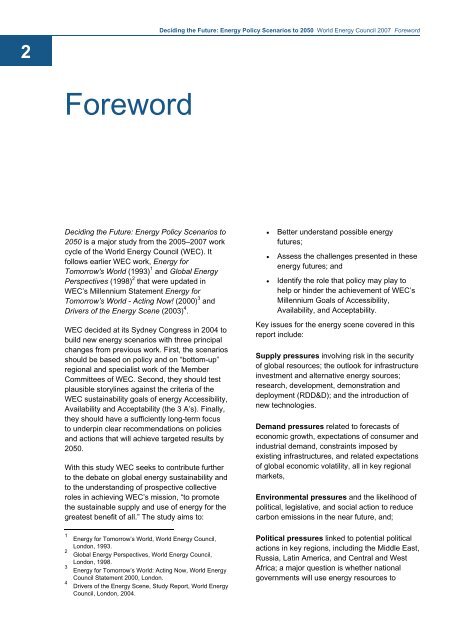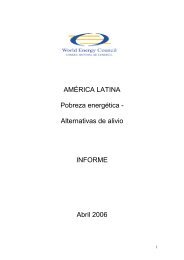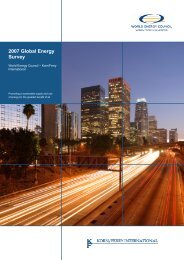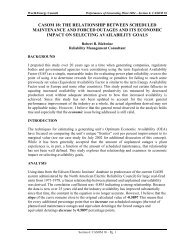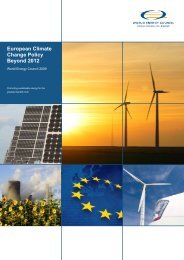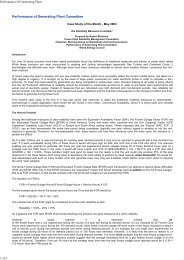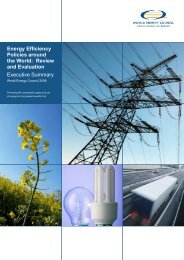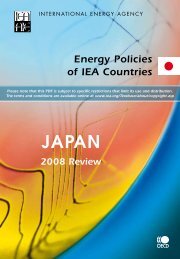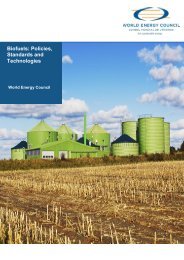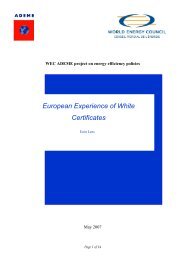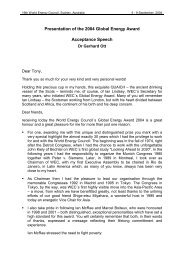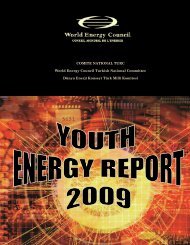Deciding the Future: Energy Policy Scenarios to 2050
Deciding the Future: Energy Policy Scenarios to 2050
Deciding the Future: Energy Policy Scenarios to 2050
Create successful ePaper yourself
Turn your PDF publications into a flip-book with our unique Google optimized e-Paper software.
2<br />
<strong>Deciding</strong> <strong>the</strong> <strong>Future</strong>: <strong>Energy</strong> <strong>Policy</strong> <strong>Scenarios</strong> <strong>to</strong> <strong>2050</strong> World <strong>Energy</strong> Council 2007 Foreword<br />
Foreword<br />
<strong>Deciding</strong> <strong>the</strong> <strong>Future</strong>: <strong>Energy</strong> <strong>Policy</strong> <strong>Scenarios</strong> <strong>to</strong><br />
<strong>2050</strong> is a major study from <strong>the</strong> 2005–2007 work<br />
cycle of <strong>the</strong> World <strong>Energy</strong> Council (WEC). It<br />
follows earlier WEC work, <strong>Energy</strong> for<br />
Tomorrow's World (1993) 1 and Global <strong>Energy</strong><br />
Perspectives (1998) 2 that were updated in<br />
WEC’s Millennium Statement <strong>Energy</strong> for<br />
Tomorrow’s World - Acting Now! (2000) 3 and<br />
Drivers of <strong>the</strong> <strong>Energy</strong> Scene (2003) 4 .<br />
WEC decided at its Sydney Congress in 2004 <strong>to</strong><br />
build new energy scenarios with three principal<br />
changes from previous work. First, <strong>the</strong> scenarios<br />
should be based on policy and on “bot<strong>to</strong>m-up”<br />
regional and specialist work of <strong>the</strong> Member<br />
Committees of WEC. Second, <strong>the</strong>y should test<br />
plausible s<strong>to</strong>rylines against <strong>the</strong> criteria of <strong>the</strong><br />
WEC sustainability goals of energy Accessibility,<br />
Availability and Acceptability (<strong>the</strong> 3 A’s). Finally,<br />
<strong>the</strong>y should have a sufficiently long-term focus<br />
<strong>to</strong> underpin clear recommendations on policies<br />
and actions that will achieve targeted results by<br />
<strong>2050</strong>.<br />
With this study WEC seeks <strong>to</strong> contribute fur<strong>the</strong>r<br />
<strong>to</strong> <strong>the</strong> debate on global energy sustainability and<br />
<strong>to</strong> <strong>the</strong> understanding of prospective collective<br />
roles in achieving WEC’s mission, “<strong>to</strong> promote<br />
<strong>the</strong> sustainable supply and use of energy for <strong>the</strong><br />
greatest benefit of all.” The study aims <strong>to</strong>:<br />
• Better understand possible energy<br />
futures;<br />
• Assess <strong>the</strong> challenges presented in <strong>the</strong>se<br />
energy futures; and<br />
• Identify <strong>the</strong> role that policy may play <strong>to</strong><br />
help or hinder <strong>the</strong> achievement of WEC’s<br />
Millennium Goals of Accessibility,<br />
Availability, and Acceptability.<br />
Key issues for <strong>the</strong> energy scene covered in this<br />
report include:<br />
Supply pressures involving risk in <strong>the</strong> security<br />
of global resources; <strong>the</strong> outlook for infrastructure<br />
investment and alternative energy sources;<br />
research, development, demonstration and<br />
deployment (RDD&D); and <strong>the</strong> introduction of<br />
new technologies.<br />
Demand pressures related <strong>to</strong> forecasts of<br />
economic growth, expectations of consumer and<br />
industrial demand, constraints imposed by<br />
existing infrastructures, and related expectations<br />
of global economic volatility, all in key regional<br />
markets,<br />
Environmental pressures and <strong>the</strong> likelihood of<br />
political, legislative, and social action <strong>to</strong> reduce<br />
carbon emissions in <strong>the</strong> near future, and;<br />
1<br />
2<br />
3<br />
4<br />
<strong>Energy</strong> for Tomorrow’s World, World <strong>Energy</strong> Council,<br />
London, 1993.<br />
Global <strong>Energy</strong> Perspectives, World <strong>Energy</strong> Council,<br />
London, 1998.<br />
<strong>Energy</strong> for Tomorrow’s World: Acting Now, World <strong>Energy</strong><br />
Council Statement 2000, London.<br />
Drivers of <strong>the</strong> <strong>Energy</strong> Scene, Study Report, World <strong>Energy</strong><br />
Council, London, 2004.<br />
Political pressures linked <strong>to</strong> potential political<br />
actions in key regions, including <strong>the</strong> Middle East,<br />
Russia, Latin America, and Central and West<br />
Africa; a major question is whe<strong>the</strong>r national<br />
governments will use energy resources <strong>to</strong>


